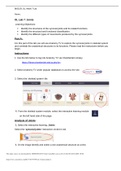Exam (elaborations)
Exam (elaborations) BIOS 251 (BIOS251)/BIOS 251 Week 7 Lab: Joints
- Course
- Institution
BIOS 251 Week 7 Lab: Joints OL Lab 7: Joints Learning Objectives: Identify the structures of the synovial joints and its related functions. Identify the structural and functional classification. Identify the different types of movements produced by the synovial joints. Part A: For this part of the ...
[Show more]



